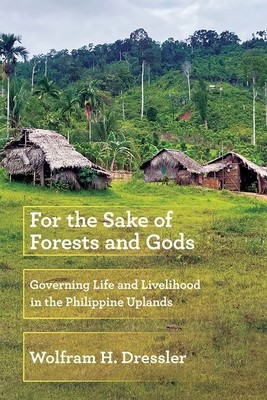
- We will send in 10–14 business days.
- Author: Wolfram H Dressler
- Publisher: Southeast Asia Program Publications
- ISBN-10: 1501779257
- ISBN-13: 9781501779251
- Format: 15.2 x 22.9 x 1.8 cm, kieti viršeliai
- Language: English
- SAVE -10% with code: EXTRA
Reviews
Description
For the Sake of Forests and Gods documents the violent consequences of nonstate actors impinging upon the existence of the Indigenous Pala'wan in the highlands of Palawan Island, The Philippines. Nimble, focused, and well-funded, religious and environmental organizations increasingly assume governmental authority over the lives and livelihoods of Pala'wan.
Wolfram H. Dressler traces these actors' history and contemporary practices, revealing how they bypass the state to "govern the less governed." In the highlands, environmental NGOs valorize customary objects and practices to suppress swidden and support forest conservation, while evangelical missionaries regulate Pala'wan beliefs, diets, health, and hygiene.
Bridging material studies and biopolitics, For the Sake of Forests and Gods explores how these nonstate actors use customary objects for comprehensive reforms of Pala'wan bodies and souls, centering on how the unique properties of the Tingkep basket mediates nonstate biopower. These reforms impact highlanders differently: some adopt biopolitical ideals willingly, others for political and economic gain. Yet others resist interventions, prioritizing family livelihoods. Ultimately, Dressler argues that Indigenous sovereignty matters more than ever as nonstate biopower intensifies in Southeast Asia's uplands.
EXTRA 10 % discount with code: EXTRA
The promotion ends in 23d.17:16:07
The discount code is valid when purchasing from 10 €. Discounts do not stack.
- Author: Wolfram H Dressler
- Publisher: Southeast Asia Program Publications
- ISBN-10: 1501779257
- ISBN-13: 9781501779251
- Format: 15.2 x 22.9 x 1.8 cm, kieti viršeliai
- Language: English English
For the Sake of Forests and Gods documents the violent consequences of nonstate actors impinging upon the existence of the Indigenous Pala'wan in the highlands of Palawan Island, The Philippines. Nimble, focused, and well-funded, religious and environmental organizations increasingly assume governmental authority over the lives and livelihoods of Pala'wan.
Wolfram H. Dressler traces these actors' history and contemporary practices, revealing how they bypass the state to "govern the less governed." In the highlands, environmental NGOs valorize customary objects and practices to suppress swidden and support forest conservation, while evangelical missionaries regulate Pala'wan beliefs, diets, health, and hygiene.
Bridging material studies and biopolitics, For the Sake of Forests and Gods explores how these nonstate actors use customary objects for comprehensive reforms of Pala'wan bodies and souls, centering on how the unique properties of the Tingkep basket mediates nonstate biopower. These reforms impact highlanders differently: some adopt biopolitical ideals willingly, others for political and economic gain. Yet others resist interventions, prioritizing family livelihoods. Ultimately, Dressler argues that Indigenous sovereignty matters more than ever as nonstate biopower intensifies in Southeast Asia's uplands.


Reviews